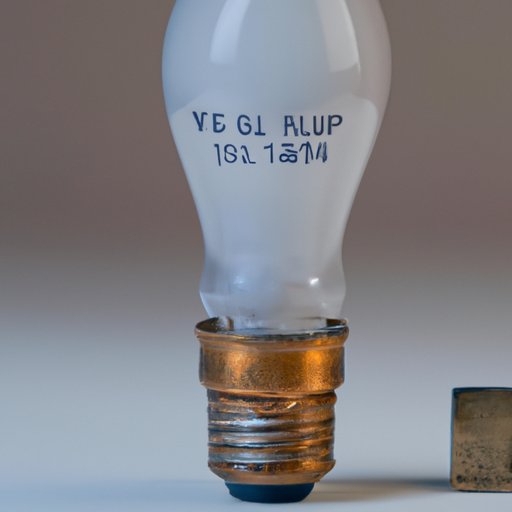Introduction
The invention of the light bulb is one of the most important inventions of all time. But who was responsible for this revolutionary invention? This article will explore the history of the light bulb and its impact on society, looking at the various inventors who were involved in its development and examining the different designs that have been used through the ages.

Biography of the Inventor of the Light Bulb
The two most famous names associated with the invention of the light bulb are Thomas Edison and Joseph Swan. Edison was an American inventor who is credited with creating the first successful light bulb. He worked on his project for years, experimenting with different designs and materials until he eventually succeeded in 1879. Swan was a British scientist who had also been working on the development of incandescent lighting. He patented his design in 1878, just a year before Edison’s success.
Although Edison and Swan are the two most famous names associated with the invention of the light bulb, there were other contributors as well. Humphry Davy and Warren de la Rue both experimented with electric lighting in the early 1800s, and Henry Woodward and Matthew Evans patented their own design in 1874. These men may not be as well-known as Edison and Swan, but their work paved the way for the modern light bulb.
Exploring the History of the Invention of the Light Bulb
The invention of the light bulb can be traced back to the early 19th century when Humphry Davy conducted experiments with electricity and incandescent lighting. He was the first to demonstrate that electric current could be used to create light, but he was unable to develop a practical lighting system due to the limited resources available at the time.
In the mid-1800s, Warren de la Rue developed a design for a carbon filament lamp, but it was not a commercial success. Meanwhile, Henry Woodward and Matthew Evans patented their own design in 1874, but they were unable to find financial backing to produce it. Finally, in 1878, Joseph Swan was granted a patent for his design of an incandescent light bulb, and the following year Thomas Edison succeeded in creating a commercially viable light bulb.

Understanding the Impact of the Light Bulb on Society
The invention of the light bulb had a huge impact on society. Before its invention, people relied on candles, oil lamps, and gas lights for illumination, which was expensive and inefficient. The light bulb made it much easier and cheaper to provide lighting in homes, businesses, and public spaces.
The introduction of the light bulb also had a profound effect on quality of life. It allowed people to extend their daily activities into the evening hours, providing more leisure time. It also improved working conditions, allowing factories and offices to stay open longer and reducing the need for dangerous candle-lit workplaces.

Examining the Different Technologies Used to Create the Light Bulb
Over the years, different technologies have been used to create the light bulb. Early designs used carbon filaments, which were fragile and prone to burning out quickly. Metal filaments improved on this design by providing a longer-lasting and more reliable source of light. More recently, halogen bulbs have become popular, as they are more energy-efficient and last longer than traditional incandescent bulbs.
How the Invention of the Light Bulb Changed the Way We Live
The invention of the light bulb changed the way we live in many ways. By increasing access to electricity, it enabled the development of new technologies such as refrigerators, washing machines, and televisions. It also improved productivity, allowing businesses to stay open later and for people to work more efficiently. Additionally, it opened up new entertainment possibilities, such as movies and sports events.
The invention of the light bulb also brought convenience to the home. People no longer had to rely on oil lamps or candles to light their homes, and they could enjoy the comfort of artificial light during the evening hours.
An Overview of the Patents and Legal Issues Surrounding the Invention of the Light Bulb
The invention of the light bulb was surrounded by legal disputes over patents. Edison was the first to patent his design, and he went on to sue companies that infringed upon his patent. However, his patents were eventually overturned due to prior art from earlier inventors. Subsequent legal challenges further complicated the situation, leading to the current copyright laws that protect inventors’ rights.

Comparing the Various Designs of Light Bulbs Through the Ages
The design of the light bulb has evolved over the years. Incandescent bulbs, which use a filament heated by electricity, are still widely used today. More recently, fluorescent bulbs have become popular due to their greater efficiency, while LED bulbs have become the go-to choice for those looking for a more energy-efficient option.
Conclusion
The invention of the light bulb was a revolutionary event that changed the way we live. Its invention was the result of many years of experimentation by a number of inventors, including Thomas Edison and Joseph Swan. The invention had a huge impact on society, increasing access to electricity and improving quality of life. It also opened up new possibilities for entertainment and convenience, and it has continued to evolve over the years with the development of new technologies.
(Note: Is this article not meeting your expectations? Do you have knowledge or insights to share? Unlock new opportunities and expand your reach by joining our authors team. Click Registration to join us and share your expertise with our readers.)
